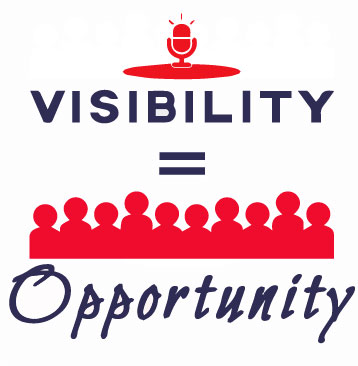At Innovation Women, we talk to a lot of women about their speaking engagements and the speaking invitations they receive. We also work closely with event managers who report back on how their invitations are received. Many managers tell us they start with diverse panels and gender-balanced slates, only to end up with an #AllMalePanel on game day. Why?
Carefully crafting an interesting and diverse speaker slate or panel takes time and effort. Event managers look for interesting and articulate speakers. Many events are businesses and so-called Big Names sell tickets. One event manager told us that an intern from Google would sell more tickets than a CEO from an unknown startup… and other event managers tell us this is not an exaggeration.
Carefully crafting an interesting and diverse speaker slate or panel takes time and effort. Event managers look for interesting and articulate speakers. Many events are businesses and so-called Big Names sell tickets. One event manager told us that an intern from Google would sell more tickets than a CEO from an unknown startup… and other event managers tell us this is not an exaggeration.
If you’ve ever played female conference speaker bingo, you’ll know that one of the reasons given by event managers for the dearth of female speakers is that the female speakers invited turn down opportunities or cancel in disproportionate numbers. While many reasons for not accepting a speaking engagement are the same for men and women (schedule conflict, etc.) there are some reasons that we seem to hear more from women.
We categorize the top reasons into three basic categories: time, timing and money.
Time – A speaking engagement is usually not just a speaking engagement. There is preparation, travel, conference attendance and usually considerable time out of the office. There are two different kinds of time-crunches that lead to a “no” – personal and professional. According to any number of studies, working women are still more likely to own the lion’s share of home responsibilities and child care, which can leave them feeling time-crunched and unlikely to want to add more to their plate.
Women are also more likely to work for smaller companies where “extra” work, like that done for a speaking engagement, takes a back seat. Women are more likely to work part-time (twice as likely compared to men according to Pew Research) and so a day out of the office is a bigger deal than if you aren’t in every day.
And, we already know that there are women who have managed to get “on the circuit” and who keep getting an out-sized percentage of speaking invites. They have to turn down many of these because they don’t have time to do them all.
Timing – If you are responsible for scheduling things for a whole family – pickups, drop-offs, sports, activities, doctors and dentists, it stands to reason that you’ll need a little more notice to get away to do a speaking engagement but this isn’t the main reason we cite timing. We hear from many women that they frequently get invitations less than a month ahead of an event – not leaving them enough time to feel comfortable preparing for a speaking engagement.
Some invites come in only a few days ahead of an event – making it obvious they are the second choice, the replacement or the remedy for a panel that has been called out for lack of diversity. If you are booking speakers at the last minute, women are more likely to say “no thanks” because they don’t have the personal or professional flexibility.
Money – It’s complicated. More than half of all speaking engagements we book through Innovation Women are unpaid and uncompensated (no coverage for expenses.) They do offer valuable visibility which can lead to career mobility, customer and partner connections, and can be seen as auditions for paid speaking gigs, and more. But if everyone is in the same boat, why do women turn down more of these offers? Again, women are more likely to work with smaller companies where budget for conferences and travel is more precious; they have to be selective.
But even in large companies, women are less likely to ask to attend conferences and events unless they are compensated. Part of the “Women Don’t Ask” phenomena is that women are reluctant to ask for the extras…and attending a conference, even as a speaker, is an extra. It might also mean admitting, publicly, or to your boss, that you got invited to speak but without the incentive/glory of getting paid to speak.
There are other things that event managers should consider when inviting women to speak at a conference:
- That Specific Speaker. Are you inviting that specific speaker or “someone” from the company or in that role? “Someone” invitations are more likely to get passed on and you have at least a 50 percent chance that the new speaker won’t help with your diversity goals. Tell me why you want ME.
- AllFemalePanels. Are you inviting a woman to be on a panel that is some variation of Women CEOs, Female Founders, Women in Tech, or Women in Our Industry? These are fine only when you are also including the same speaker on a Top CEOs panel, or Top People in Our Industry panel. And some women are just done with these kinds of panels and will turn them down as a matter of course.
- The previous 16 annual events you put on were AllMalePanel bonanzas with AllMaleAudiences. I applaud you for trying to get more women speaking and attending your conferences and events but if all the photos I see from previous events, even the crowd shots, put the men front and center, I start to wonder. How will my remarks will be received? How much time will I spend fielding questions about being the only or one of the few women in the room? How often will I be interrupted while speaking, or held up to ridicule? At Innovation Women, we did some work with a large media company in the last year that kept sending us email blasts and event pictures that showed women only in the background and audiences full of younger white men. With so many options for events to attend, why would any woman attend this one?
- Show me the money, or at least the value, in your event. If your previous events didn’t have many women speakers or many women in attendance, there aren’t many women who know your event intimately, and can advocate on its value. It’s easy to decide on the value of an event if you have previously attended it. You know the audience, the quality of the sessions and more. Never been there? It’s a toss-up.
So. Women, why do you turn down speaking engagements? And what would help you say “yes” to more of them?


